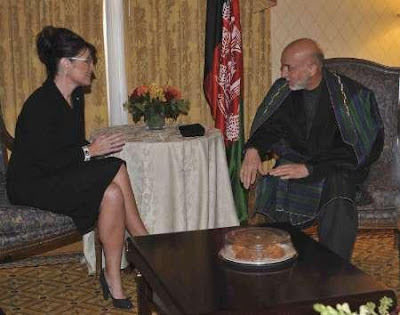Even If Palin Does Think Afghan Policy Is Wrong, It Doesn't Make It Right
>

Palin & Karzai-- trading tips on voter fraud?
Despite her massive unpopularity-- and status, to non-teabaggers, as a rather embarrassing and borderline outré vaudeville act-- Sarah Palin's proclamation that Obama is wrong on Afghanistan won't make it any easier for him to be perceived as being correct. Most Americans say the war isn't worth fighting-- and they're correct. A huckster and a self-proclaimed rogue, Palin has turned herself into a classic American crank whose opinions are sought as entertainment. She'll pontificate about teenager Levi's sexuality in one sentence and in the next, without skipping a beat, weigh in on the most profound foreign policy matters facing the nation. She's the walking embodiment of Charles Pierce's American Idiot. But she's not enough of a distraction, not even this week in full huckster mode, to get Obama off the hook. He's still got to figure out what to do about Afghanistan.
The U.S. ambassador to Afghanistan, General Karl Eikenberry, who served two tours of duty there, the second as head of the Combined Forces Command, is telling Obama-- as is General Wesley Clark-- that its a hopeless mess and we should get out, and fast. Fluent in Chinese, he's a West Point graduate with advanced degrees from Harvard and Stanford. He has a far better understanding of Afghanistan than the hawkish and political Stanley McChrystal.
It seems that General McChrystal is on a special mission based on a specific philosophy of warfare and that General Eikenberry is performing his duty according to his current assignment with an ongoing evaluation of the various players and facts at hand. McChrystal's job has been killing what Seymour Hersh called "enemies of the state" in Afghanistan and Iraq. He's not finished. They're still out there. He made commitments to the 400 officers and soldiers that he hand-picked. He doesn't want to let them down.
Given his history and assignments before his command role, everything he's done suggests that he would want to finish the job. Why wouldn't he push for as many more troops as he can get?
But the real questions are: does finishing that job make any sense and will more troops help finish the job?
Eikenberry's position has evolved over time. He once got along with Karzai, but, as ambassador, during the recent presidential campaign, he appeared with the opposition candidates who accused Karzai of election fraud in the first election and pushed Karzai to overturn the initial disputed results that would have ruled out a runoff election.
Can you recall any U.S. ambassador ever showing up at a press conference with opposition candidates challenging the legitimacy of an election?
Eikenberry was interviewed on NPR just two days after he testified before Congress in 2007. He said, "The Taliban military forces remain a much weaker enemy. Whenever the Taliban masses on the battlefield, those Taliban forces are defeated, always in very short order." He went on to offer this: "… the challenge has been building the state of Afghanistan, extending the writ of governance. That has been a very steady growth of progress that we've had with the government of Afghanistan over the last six years" NPR Feb. 13, 2007.Two and a half years later, General Eikenberry has "expressed in writing his reservations about deploying additional troops to the country" just at the point when President Obama was said to be announcing some level of troop increases. The key to success, as outlined by the general previously, was real progress in responsive and trustworthy civil governance that delivers for the people.
In his congressional testimony, Eikenberry quoted a poll in which, "almost 90% of the Afghan people consider reconstruction and economic development the most important requirement to improve their quality of life."
It is fair to assume that the illegitimate election played a major role in Eikenberry's questions about the future of the Afghanistan military mission. His recommendations represent a huge step given the stakes for the NATO military effort and the larger concerns about the nation. Other factors may have included the McChrystal emphasis killing "bad guys" and the inevitable deaths of innocents paired with lackluster U.S. financial support for Afghan rebuilding and development.
General Eikenberry is both a soldier and scholar of history and political science. He knows the history of occupations that fail to deliver for the populace and he's telling us right now that the U.S. can't succeed with more military forces in a nation run by an illegitimate president who has been exposed for election fraud. More troops are not the solution. In his view, success requires stronger governance and real democracy which means transparent elections free of fraud.
Yesterday Alan Khazei, a candidate to fill Ted Kennedy's Senate seat, came out strongly for a drawdown in Afghanistan. And more important, leaders of the Congressional Progressive Caucus, Raúl Grijalva, Michael Honda, Lynn Woolsey, Barbara Lee and James McGovern, sent Obama a respectful letter asking for a meeting to help him come to the right decision on Afghanistan. All five were among the courageous 32 Democrats who opposed his supplemental war budget in June. None will vote for any further money for Afghanistan without a disengagement strategy and timeline. Click on the image to get a clear photocopy of the letter itself:

Please consider giving a re-election contribution, even a $10 or $20 one, to any of the 32 Democrats working to end this catastrophe. Yep, you actually can help save this country-- and our president-- from a real disaster.
Labels: Afghanistan, Progressive Caucus, Sarah Palin



1 Comments:
Congressional Progressive Caucus members Raúl Grijalva, Michael Honda, Lynn Woolsey, Barbara Lee and James McGovern are all documented communists and socialists.
See the proof here: http://www.commieblaster.com/progressives/index.html
Post a Comment
<< Home